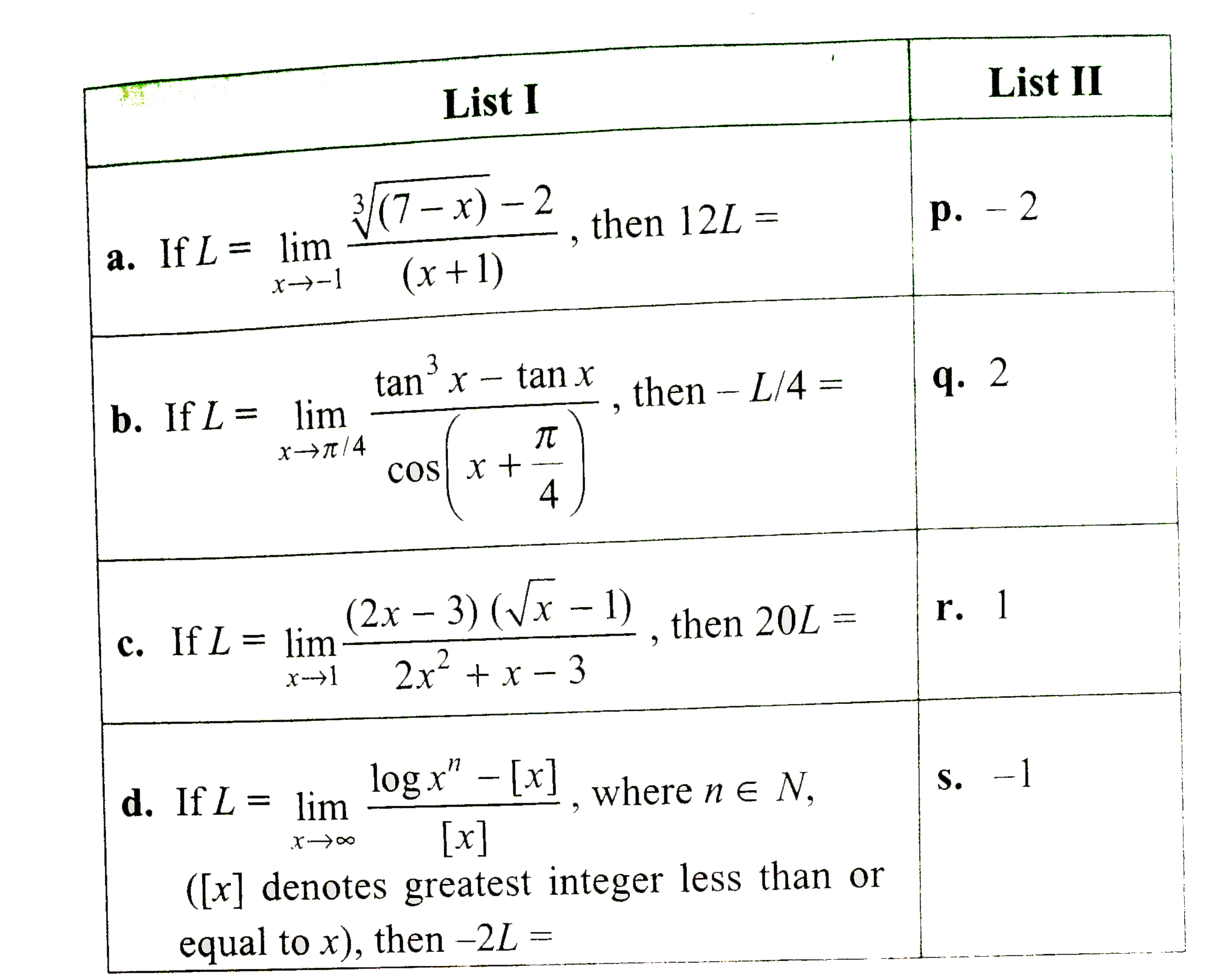limn→∞n2(x1n−x1(n+1)),x>0 , is equal to (a)0 (b) ex (c) (log)ex (d) none of theseSolution in Bengali
π
2π
π/2
none of these
The correct Answer is:C
limn→∞n2(x1/n−x1n+1)=limn→∞n2.x1n+1(x1n−1n+1−1)
=limn→∞x1n+1(x1n(n+1)−1)n2
=limn→∞x1n+1.x1n(n+1)−11n(n+1).n2n(n+1)
=1.logex.1=logex
Topper's Solved these Questions
- BOOK - CENGAGE PUBLICATIONCHAPTER - LIMITSEXERCISE - Linked Comprehension Type20videos
LIMITS
- BOOK - CENGAGE PUBLICATIONCHAPTER - LIMITSEXERCISE - Matrix Match Type5videos
LIMITS
- BOOK - CENGAGE PUBLICATIONCHAPTER - LIMITSEXERCISE - EXERCISE 2.88videos
LIMITS
- BOOK - CENGAGE PUBLICATIONCHAPTER - JEE 2019EXERCISE - Chapter 108videos
JEE 2019
- BOOK - CENGAGE PUBLICATIONCHAPTER - LINEAR COMBINATION OF VECTORS, DEPENDENT AND INDEPENDENT VECTORSEXERCISE - DPP 1.210videos
LINEAR COMBINATION OF VECTORS, DEPENDENT AND INDEPENDENT VECTORS
Similar Questions
Letf(x)=sin−1(1−{x})×cos−1(1−{x})√2{x}×(1−{x}), where {x} denotes the fractional part of x.
L=limx→0−f(x) is equal to02:10View SolutionMatch the following lists:
 03:12View Solution
03:12View SolutionEvaluate limx→1cosπ2x1−√x
03:36View SolutionIf y = y(x) is the solution of the differential equation, xdydx+2y=x2 satisfying y(1) = 1, then y(12) is equal to
07:00View SolutionThe number of integral values of p for which (p+1)ˆi−3ˆj+pˆk,pˆi+(p+1)ˆj−3ˆk and −3ˆi+pˆj+(p+1)ˆk are linearly dependent vectors is q
03:16View Solution(lim)x→∞{11−n2+21−n2+n1−n2}isequa<o 0 (b) −12 (c) 12 (d) none of these
05:29View Solutionlimx→∞n2(x1n−x1(n+1)),x>0 , is equal to (a)0 (b) ex (c) (log)ex (d) none of these
03:15View Solutionlimx→∞(xlog(x)31+x+x2 equals 0 (b) −1 (c) 1 (d) none of these
04:42View SolutionThe value of limx→∞(2xn)1ex−(3xn)1exxn (where n∈N) is (a)logn(23) (b) 0 (c) nlogn(23) (d) none of defined
View Solutiondndxn(logx)= (a)(n−1)!xn (b) n!xn (c)(n−2)!xn (d) (−1)n−1(n−1)!xn
03:50View Solution(lim)x→0(1x+2x+3x++nxn)1x is equal to (n !) n b. (n!)1/n c. n! d. ln(n!)
07:03View SolutionLet A,=([1,-(x)/(n)(x)/(n),1]),B=([0,-11,0]) then lim_(x rarr0)[lim_(n rarr oo)(1)/(x)(I-A^(n))] equals
07:13View Solutionlim_ (n rarr oo) n ^ (2) (x ^ ((1) / (n)) - x ^ ((1) / (n + 1))), x> 0
02:41View SolutionIf limx→I−∞∏n=0(1+xn+1(1+xn)xn)=l then [1l] is equal to __________
01:27View Solutionlimx→∞n2(x1n−x1(n+1)),x>0 , is equal to (a)0 (b) ex (c) (log)ex (d) none of these
13:14View Solutionlimx→∞(xlog(x)31+x+x2) equals 0 (b) −1 (c) 1 (d) none of these
03:39View Solution

